The crown was initially discovered during excavations in 2020, but now a closer look has revealed just how spectacular it really is.
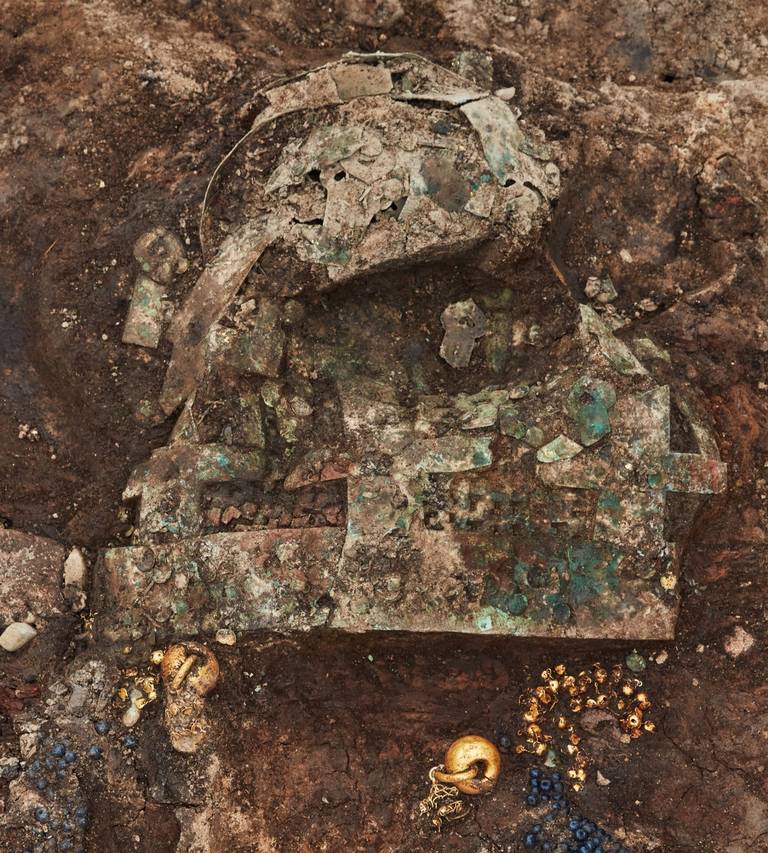
Korea Heritage ServiceAlthough many of the beetle wings have lost their color, a few retained their hue even after 1,400 years underground.
Archaeologists have unearthed a stunning, first-of-its-kind artifact from an ancient tomb in Gyeongju, South Korea. During excavations at a burial dubbed Tomb 120-2, they came across a 1,400-year-old ceremonial crown adorned with jewel beetle wings atop the skull of an elite who lived during the Silla Kingdom.
The wings were inlaid into upside-down heart-shaped perforations on the crown. Although the initial discovery was made in 2020, the wings were difficult to immediately identify because they had lost their color over the years. It was only after conservators were able to gather 15 of the wings — seven of which were still embedded in the crown — that they realized what they had found.
Now, this discovery is shedding new light on the ritual burial practices of the Silla Kingdom.
The Artifacts Unearthed From A Silla Kingdom Tomb
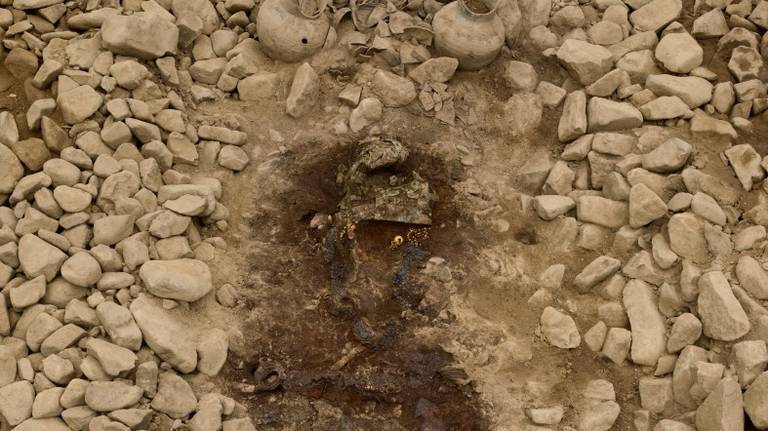
Korea Heritage ServiceThe tomb in Gyeongju was fairly mundane from the outside but contained a wealth of artifacts.
The Silla Kingdom (57 B.C.E. to 935 C.E.) was one of ancient Korea’s Three Kingdoms, alongside Baekje and Goguryeo, and the first to unify the Korean Peninsula. The Silla Kingdom, in particular, was known for its extensive cultural exchanges with other parts of Asia, Buddhist influence, and sophisticated art and craftsmanship.
Gyeongju, historically known as Seorabeol, once served as the royal capital.
Other artifacts recovered from the region have previously revealed the use of jewel beetle wings as a decorative element for the elite aristocracy, such as belts and horse harnesses. This new discovery, however, marks the first time archaeologists have found a crown adorned with beetle wings.
Jewel beetle wings were considered precious due to their emerald color, but that color has faded over the centuries. As such, researchers did not initially recognize the crown for what it was.
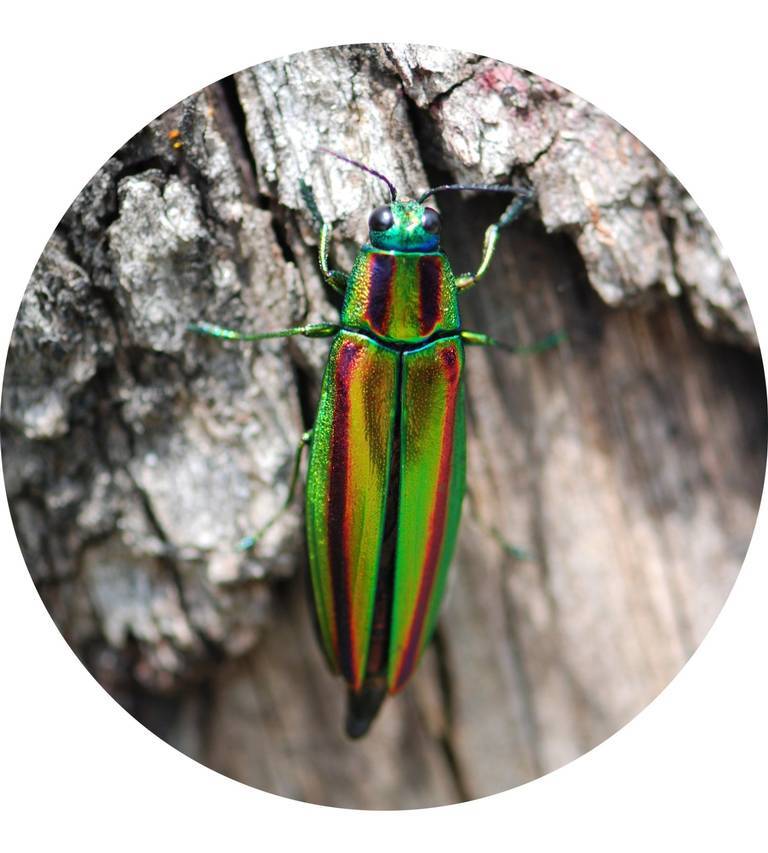
Korea Heritage ServiceA jewel beetle, the wings of which were used to decorate various accessories in ancient Korea.
According to a press statement from the Korea Heritage Service, archaeologists initially excavated the grave in 2020 and were shocked to find a wealth of treasures in what was an otherwise mundane tomb. Inside, however, they unearthed a range of ornamental attire from the sixth century C.E., including gold earrings, pendants, a silver belt, a bead bracelet, several silver rings, bronze shoes, and the crown.
Even at the time of discovery, archaeologists were touting the crown as the most splendid ever found in the Gyeongju area. Conservation work has since revealed how much of an understatement that really was.
The Discovery Of The Jewel Beetle Wings In The Ancient Crown
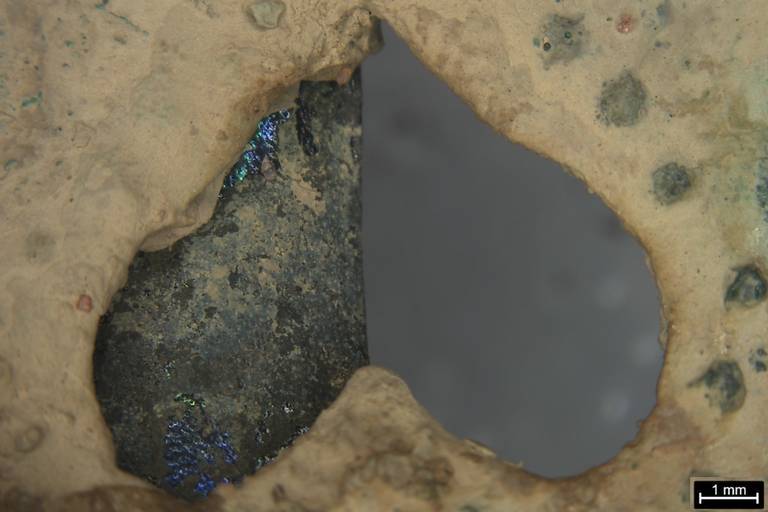
Korea Heritage ServiceA close-up view of the inlay and beetle wings on the crown.
Although just seven of the beetle wings remained fixed in their original position, eight more were found strewn about the grave. The crown is bent slightly out of shape now, but a diagram from the Korea Heritage Service shows what it once looked like.
The base of the crown was a thin band from which five vertical decorations branched off. The middle three decorations were four-tiered scales inlaid with the beetle wings, while the two outer decorations looked something like antlers. The wings were placed in upside-down heart-shaped perforations all around the crown.
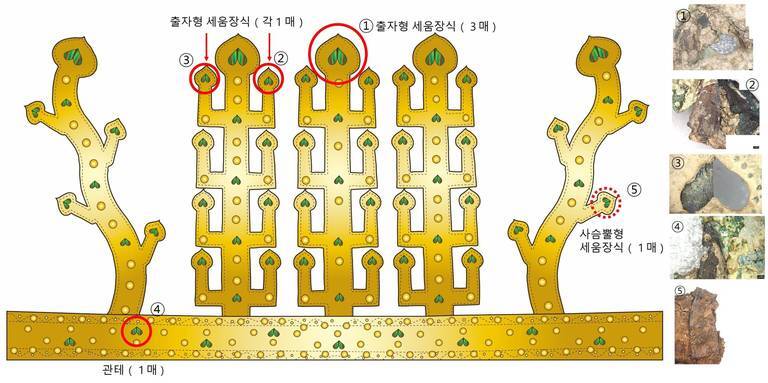
Korea Heritage ServiceA diagram of what the crown once looked like.
The crown itself was made of bronze and then coated in a thin layer of gold. In addition to the beetle wings, it also once had gold beads and pieces of jade hanging from it.
A few of the wings retained their original green, yellow, and red hues, but most had blackened with the passage of time.
There are still many questions about the crown and the person who once wore it, though. Researchers have thus far been unable to identify the deceased in the tomb, and additional mysteries — such as the inclusion of a metal plate between the crown’s band and vertical ornaments — are the focus of further analysis.
Regardless, this new discovery adds to the greater understanding of the lives and cultural practices of Silla royalty and reaffirms Gyeongju’s status as an important, treasure-filled archaeological site.
After reading about the ancient crown adorned with jewel beetle wings found in South Korea, learn about the fascinating history of South Korea’s Haenyeo, the “Mothers of the Sea.” Then, see stunning rare photos of the Korean Empire before it was torn in two.





